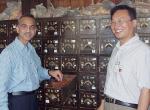Growing healthy links to China
 Public Health Public Health
The University of Adelaide's links with China continue to grow, with its involvement in a recent health project set to have an impact on the lives of millions of Chinese people. Dr Afzal Mahmood, Lecturer in the University's Department of Public Health, has been the driving force behind increasing collaborations with health officials and academics in Shandong province. Shandong is located in China's East, and has a population of some 90 million people. The University of Adelaide already has a strong partnership with Shandong, including a longstanding agreement of almost 20 years with Shandong University which was re-signed again last year. Dr Mahmood's project, aimed at improving rural health care, involves the University's Department of Public Health assisting the Shandong Department of Health's Division of Community Health, and Division of Medical Scientific Research, Education and International Cooperation. "A larger number of people in Shandong live in rural areas, and they often find it difficult to get the quality care they need," Dr Mahmood said. "There is also a lack of integration between the local village clinic, and the township hospital - so for example, someone might go to the hospital when they have something that could be treated locally at the clinic, or the clinic staff do not have optimum training to manage certain diseases." "What we did was conduct an operations research, with the idea of making a 'template' for improved rural health care which could be replicated across the rest of the province," Dr Mahmood said. "Community surveys and analysis of village clinics' situations pointed to various areas, such as infrastructure, equipment and staff training, where improvements can be made, and we have started planning for a quality of care project to be piloted in five village clinics and one township hospital." Funding for this project has come from a number of sources, including Department of Public Health, and the offices of the Faculty of Health Sciences' Associate Dean International, and Pro-Vice Chancellor (International). AusAID, through its Australian Youth Ambassador for Development program, sponsored a young Master of Public Health graduate from Australia, Alexandra Raulli, to take part in a six-month exchange to Shandong to assist with implementation of research. Dr He Wang at the University's Department of Public Health is a fellow researcher. Rotary Australia World Community Services will provide support for infrastructure development in five village clinics and a township hospital in the pilot study. Its medical arm, International Infancy, Midwifery, Gynaecology and Obstetrics, may also provide the needed specialist training for the hospital. Story by Ben Osborne
|





